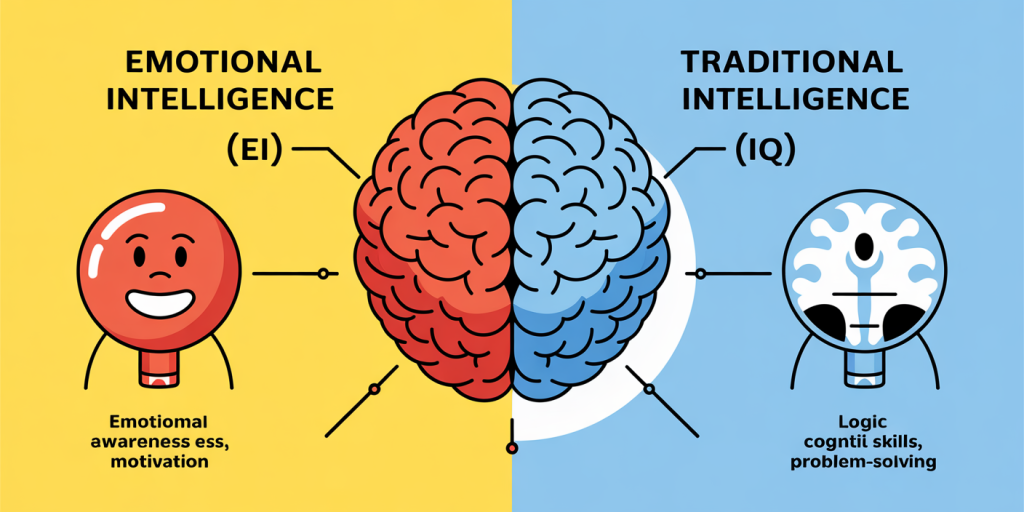Emotional Intelligence: What It Is and How It Impacts Your Decisions
In today’s fast-paced and interconnected world, emotional intelligence (EI) has emerged as a critical factor influencing personal and professional success. Beyond mere cognitive ability, emotional intelligence touches upon how individuals perceive, manage, and respond to emotions in themselves and others. Its importance spans various domains from leadership effectiveness to relationship management, fundamentally shaping the decisions we make every day. This article delves into the definition of emotional intelligence, explores its core components, analyzes its impact on decision-making, and presents practical examples supported by real data. Additionally, it looks ahead to the evolving role of EI in future societal and workplace trends.
Understanding Emotional Intelligence: Definitions and Core Components
Emotional intelligence refers to the ability to recognize, understand, manage, and influence emotions in oneself and others. Psychologist Daniel Goleman popularized the concept in the mid-1990s, defining EI as a set of emotional and social skills that influence the way we perceive and express ourselves, develop and maintain social relationships, cope with challenges, and use emotional information in an effective and meaningful way.
The five key components of emotional intelligence usually recognized are:
Anúncios
1. Self-awareness: The ability to recognize and understand one’s own emotions. 2. Self-regulation: Managing or redirecting disruptive emotions and impulses. 3. Motivation: A passion to work for reasons beyond money or status. 4. Empathy: Understanding the emotional makeup of others. 5. Social skills: Managing relationships to move people in desired directions.
A 2019 study published in the *Journal of Organizational Behavior* emphasized that high emotional intelligence correlates strongly with leadership effectiveness, better team collaboration, and conflict management. For instance, leaders with strong EI tend to create more motivated and engaged workplaces, directly influencing the performance outcomes and decision scopes of their teams.
Emotional Intelligence vs. Traditional Intelligence: A Comparative Perspective
While traditional intelligence, often measured through IQ tests, reflects a person’s cognitive capabilities such as analytical skills, logic, and problem-solving, emotional intelligence centers on recognizing, interpreting, and interacting on an emotional level.

Anúncios
| Aspect | Emotional Intelligence (EI) | Traditional Intelligence (IQ) |
|---|---|---|
| Focus | Emotions, social interactions | Cognitive ability, logical reasoning |
| Measurement | Self-assessments, 360-degree feedback, emotional tests | Standardized IQ tests, academic performance |
| Role in decision-making | Influences interpersonal decisions and emotional regulation | Critical thinking, problem-solving |
| Impact on success | Critical for leadership, teamwork, negotiation | Important for academic and technical achievement |
| Development potential | Can be developed with practice and awareness | Largely stable, with limited growth post-adolescence |
This table illustrates that EI complements rather than replaces traditional intelligence. For example, a highly intelligent individual may excel in technical tasks but fail to make sound social or emotionally informed decisions, limiting overall effectiveness.
An illustrative example can be drawn from the corporate world. Satya Nadella, CEO of Microsoft, credited his success partly to a focus on empathy and emotional intelligence, which helped him transform company culture and foster innovation, a feat that raw technical IQ alone might not have achieved.
How Emotional Intelligence Shapes Decision-Making
Decision-making is a complex process involving not just cognitive logic, but emotional and social dynamics. Emotional intelligence enables individuals to better interpret emotional inputs and apply them in decision-making, resulting in more balanced and effective outcomes.
Emotional self-awareness allows decision-makers to identify emotional biases or impulses that might skew judgment. A clear understanding of one’s feelings helps prevent emotionally driven rash decisions. For example, in high-stress scenarios such as crisis management, leaders with high EI remain calm and collected, using emotions as valuable data rather than reacting impulsively.
Moreover, empathy plays a pivotal role when decisions impact others. For instance, a manager deciding on workplace restructuring may leverage empathy to anticipate employee reactions and mitigate negative impacts, leading to smoother transitions and greater acceptance.
Research from the *Harvard Business Review* in 2018 reported that leaders with strong emotional intelligence made decisions that were 23% more likely to result in positive organizational outcomes and employee satisfaction compared to their less emotionally savvy counterparts.
Practical Applications of Emotional Intelligence in Everyday Life
Emotional intelligence is not confined to boardrooms; it plays an integral role in everyday personal decisions. Consider the realm of relationships—whether familial, friendships, or romantic partnerships—an individual with high EI probably navigates conflicts more adeptly, communicates feelings effectively, and negotiates compromises.
For example, imagine a couple facing disagreement on financial priorities. A partner equipped with emotional intelligence recognizes the underlying fears or anxieties, reframes the conversation to address emotional concerns, and collaboratively develops a budget plan satisfying both parties. This approach contrasts sharply with conflict fueled by misunderstandings or emotional suppression.
In professional settings, EI influences networking and collaboration. A study by TalentSmart showed that 90% of top performers have high emotional intelligence, highlighting its undeniable role in ambition fulfillment.
Additionally, emotional intelligence supports stress management and mental well-being, which in turn affect decision quality. Mindfulness practices, linked to increased emotional regulation, have been associated with improved focus and better judgment under pressure, according to a 2020 review in *The Journal of Applied Psychology*.
Emotional Intelligence in Leadership: Case Studies and Impact
Leadership effectiveness hinges extensively on emotional intelligence. Leaders with high EI foster trust, communicate effectively, manage conflicts, and cultivate positive workplace atmospheres. Notable case studies illustrate this.
Case Study 1: Oprah Winfrey Oprah Winfrey’s rise to being a media mogul and philanthropist is attributed largely to her emotional resilience and ability to connect with others empathetically. Her emotional intelligence allowed her to turn personal hardships into powerful storytelling, building trust with millions worldwide.
Case Study 2: Paul Polman – Former CEO of Unilever Polman demonstrated how emotional intelligence can drive sustainable business decisions. By focusing on long-term welfare over short-term gains, he employed empathy and ethical considerations, influencing global corporate responsibility standards.
The table below summarizes leadership traits influenced by emotional intelligence:
| Leadership Aspect | Description | EI Component Involved |
|---|---|---|
| Conflict resolution | Mediating disputes firmly and fairly | Empathy, Self-regulation |
| Decision transparency | Openly explaining decisions to teams | Social skills, Self-awareness |
| Motivation of teams | Inspiring and energizing employees | Motivation, Empathy |
| Stress management | Remaining calm under pressure | Self-regulation |
| Adaptability | Adjusting approach based on emotional cues | Self-awareness, Social skills |
Organizations are increasingly investing in emotional intelligence development programs for executives and managers, recognizing it as a competitive differentiator. According to a 2023 Deloitte report, companies with emotionally intelligent leadership teams outperform their peers by 20% in employee engagement metrics and reduce turnover rates by 15%.


Future Perspectives: Emotional Intelligence in an Evolving World
Looking forward, emotional intelligence is set to become even more crucial as workplaces evolve with artificial intelligence (AI), remote collaboration, and diverse global teams. While AI can efficiently handle data-driven tasks and cognitive computations, it lacks emotional understanding, thereby elevating the human capacity for emotional intelligence as a key value driver.
Virtual communication increases the need for heightened emotional awareness since non-verbal cues are less visible. Tools and training that develop EI competencies will become essential to prevent misunderstandings and maintain strong interpersonal connections.
Moreover, future leadership models will emphasize empathy and emotional resilience as critical to guiding organizations through uncertainty and change. For example, the World Economic Forum predicted in 2024 that emotional intelligence will be among the top five skills needed for workforce success.
Educational systems are also incorporating EI into curricula to prepare future generations with emotional and social competencies alongside academic skills. Enhanced emotional intelligence supports better mental health, decision-making, and societal cohesion, key for addressing complex global challenges such as climate change, inequality, and technological disruption.
In summary, emotional intelligence is evolving from a “soft skill” to an essential pillar of personal and professional decision-making. As emotional literacy gains prominence, individuals and organizations prioritizing its development will navigate future landscapes with greater agility, empathy, and success.
